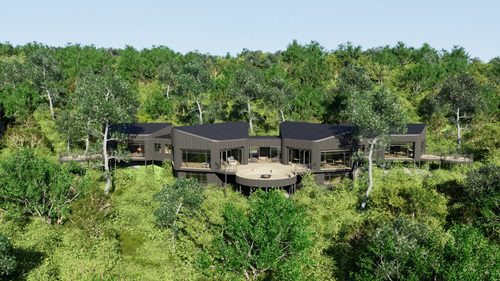 In the heart of East Africa, where the Serengeti’s plains meet the towering Kilimanjaro, a quiet revolution is reshaping the luxury tourism landscape. Lemala Camps & Lodges, a distinguished collection of eco-conscious lodges, villas, and tented camps, is not just offering travellers a glimpse of Tanzania’s natural wonders but sets a precedent for sustainable tourism that the entire industry is beginning to follow.
In the heart of East Africa, where the Serengeti’s plains meet the towering Kilimanjaro, a quiet revolution is reshaping the luxury tourism landscape. Lemala Camps & Lodges, a distinguished collection of eco-conscious lodges, villas, and tented camps, is not just offering travellers a glimpse of Tanzania’s natural wonders but sets a precedent for sustainable tourism that the entire industry is beginning to follow.
As the world emerges from the shadow of the pandemic, the resurgence of travel has sparked a renewed conversation about over-tourism and its impact on fragile ecosystems. Nowhere is this conversation more critical than in Tanzania, where the influx of visitors poses both an opportunity and a challenge. The Tanzanian government, led by Tourism Minister Angellah Kairuki, is taking decisive steps to address these concerns, prioritizing the sustainable management of the country’s iconic destinations, including the Serengeti, Ngorongoro Crater, and Kilimanjaro National Park.
With significant investments pouring into Kilimanjaro International Airport and the expansion of Dar es Salaam Airport, coupled with increased flights from Europe, Asia, and the Middle East, Tanzania is on the brink of a tourism boom. However, the focus is not just on quantity but quality—specifically, how to attract tourists who value sustainability and responsible travel.
Enter Lemala Camps & Lodges. Founded with a vision to harmonize luxury with environmental stewardship, Lemala has long been a leader in sustainable tourism. Their properties are more than just places to stay; they are sanctuaries that embody the principles of eco-friendly living and community empowerment.
The journey began over a decade ago with the establishment of Lemala Kuria Hills Lodge in the Northern Serengeti. Constructed in 2013 under the highest sustainable building practices, Kuria Hills set a new benchmark for eco-conscious luxury (with rates starting from £408/$518 per person per night on a full board basis). The success of Kuria Hills paved the way for subsequent properties, including Lemala Mpingo Ridge Lodge in Tarangire National Park and Lemala Nanyukie Lodge in the Eastern Serengeti, both of which opened in 2016 (rates start from £459/$582 per person per night on a full board basis).
Like all of Lemala’s properties, these lodges operate entirely off the grid. Powered by cutting-edge solar systems and equipped with reverse-osmosis water treatment plants, they collectively save an estimated 150 tons of CO2 annually. Lemala’s commitment to sustainability extends to the materials used in construction, including recycled light-gauge steel and composite decking, setting a new standard for environmentally friendly architecture in the hospitality industry.
But Lemala’s impact goes far beyond environmental conservation. Their deep-rooted commitment to corporate social responsibility (CSR) is woven into every aspect of their operations. From the empowerment of women’s groups to the support of homeless shelters and the provision of job opportunities for disadvantaged youth, Lemala’s initiatives are as diverse as they are impactful.
One of the most notable projects is the Reusable Sanitary Pad Project, which addresses menstrual hygiene challenges in Maasai communities. Through the sale of products in their curio shops at properties like Hamerkop House in Arusha and Lemala Wildwaters Lodge on the River Nile in Uganda (rates start from £306/$388 per person per night on a full board basis), Lemala has distributed over 3,000 reusable pads, empowering young girls to continue their education uninterrupted. This initiative addresses a critical health issue and is vital in promoting gender equality by keeping girls in school.
Lemala’s dedication to sustainability also includes significant efforts to reduce plastic waste. They make a tangible difference in local communities by leading initiatives to remove plastic from national parks and upcycling it into school furniture. Additionally, they have eliminated single-use plastics across their operations, supported sustainable fishing practices in Uganda, and provided bicycles to students, enhancing education access.
For guests, staying at a Lemala property is more than a luxurious retreat—an invitation to become part of a larger narrative of positive change. Community Excursions at Lemala’s lodges provide authentic cultural experiences benefiting local communities. The funds generated from these excursions are reinvested into schools and community projects, ensuring their immediate and long-lasting impact.
As Tanzania prepares to open the doors of the new Lemala Osonjoi Lodge on the rim of the Ngorongoro Crater in March 2025, the message is clear: luxury and sustainability are not mutually exclusive. Lemala Camps & Lodges is leading the charge in redefining what it means to experience Tanzania’s natural beauty. Through their pioneering efforts, they are proving that responsible tourism is not just possible but essential for the future of travel.
In a world where the pressures of over-tourism and climate change are ever-present, Lemala Camps & Lodges stands as a beacon of hope, demonstrating that it is possible to enjoy the world’s wonders without compromising their future.
Written by: Octavia Koo
====================================





















